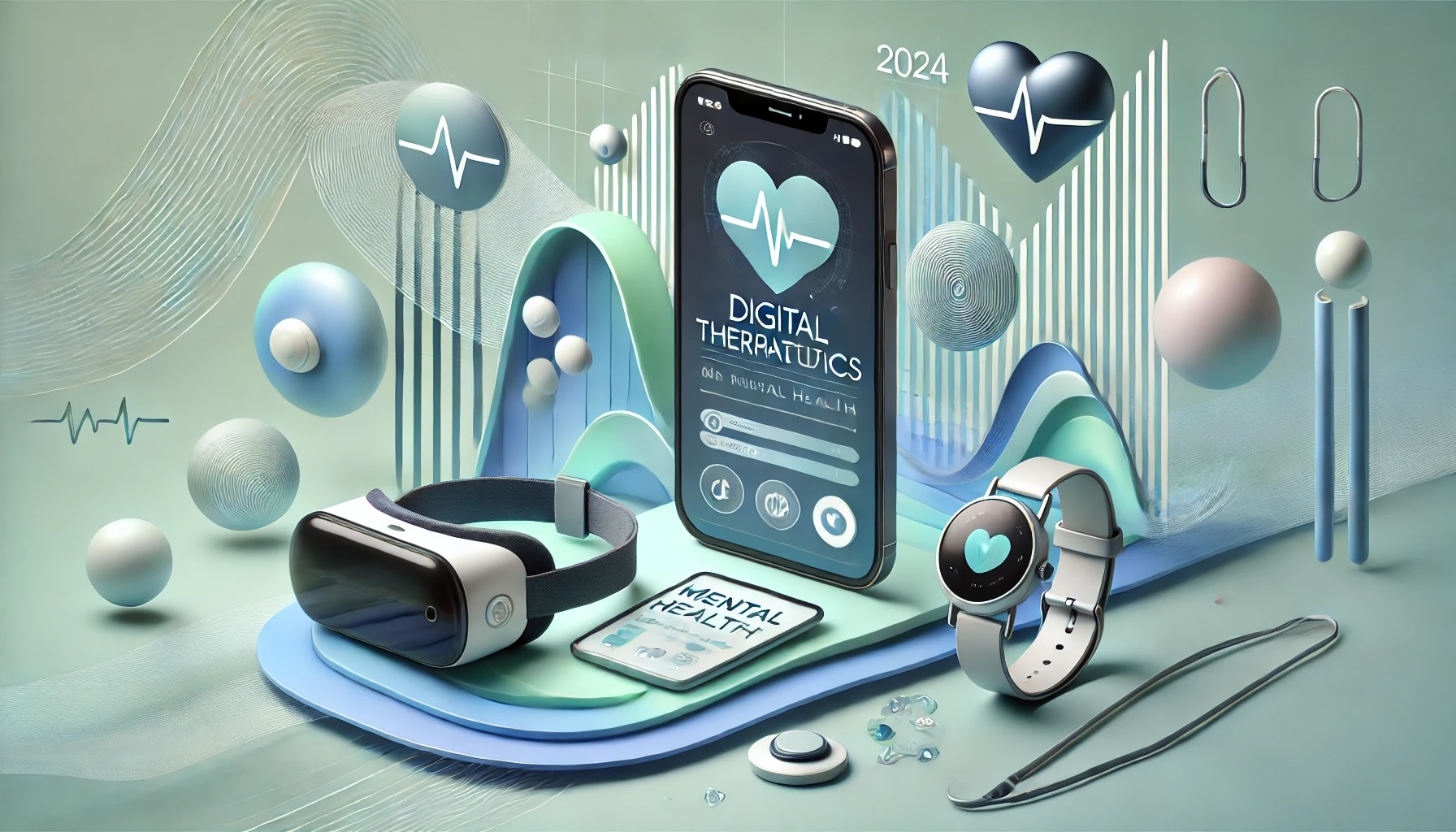As global awareness of mental health continues to grow, digital therapeutics are rapidly becoming a cornerstone innovation in the field. Digital therapeutics leverage mobile apps, virtual reality, and AI-driven solutions to help users manage mental health challenges. These methods, known for their convenience, personalization, and accessibility, are gaining significant attention in 2024.
This article explores the rise of digital therapeutics, the hottest trends in mental health technology for 2024, and how these tools can be applied to effectively manage mental well-being.
What Are Digital Therapeutics?
Digital therapeutics (DTx) are evidence-based medical interventions delivered through digital platforms. Unlike traditional mental health services, digital therapeutics offer flexibility and accessibility via smartphones, tablets, and computers, providing support anytime, anywhere.
Common features of digital therapeutics include:
• Mental health apps, such as meditation and mood tracking tools.
• Virtual reality (VR) therapy for PTSD and anxiety disorders.
• AI-powered chatbots offering instant emotional support.
These tools aim to complement or enhance traditional therapy approaches, making mental health resources more widely available.
Top Mental Health Digital Therapeutics Trends in 2024
1. AI-Powered Mental Health Support
Artificial intelligence is revolutionizing mental health care. In 2024, AI technology is widely applied in the following areas:
• Smart Chatbots: Tools like Woebot or Wysa simulate therapy conversations, providing instant emotional support and advice.
• Personalized Recommendations: AI analyzes user data to recommend suitable meditation courses, therapy plans, or support resources.
• Emotion Detection: AI evaluates user emotions through text, voice, or facial expressions and provides real-time feedback.
This technology not only increases accessibility to mental health resources but also opens new pathways for personalized care.
2. Virtual Reality (VR) Therapy
VR technology has proven effective in mental health treatment, particularly for addressing trauma, anxiety, and phobias. Key trends for 2024 include:
• Exposure Therapy: VR creates safe environments where users can gradually face fears, such as heights, social situations, or specific animals.
• Stress Reduction Programs: Immersive experiences help users practice deep breathing, meditation, or relaxation techniques.
• PTSD Treatment: VR allows patients to safely revisit and process traumatic events.
By offering an immersive approach, VR therapy enables deeper engagement and results beyond traditional methods.
3. Digitized Cognitive Behavioral Therapy (CBT)
Cognitive Behavioral Therapy (CBT) is a widely used mental health treatment. Its digitized versions take convenience and effectiveness to new heights. In 2024, popular applications include:
• Interactive Courses: Apps deliver CBT modules to help users manage anxiety, depression, and stress.
• Real-Time Feedback: Some platforms offer instant feedback, aiding users in identifying and reframing negative thought patterns.
• Behavior Tracking: Users can log daily emotions and behaviors to monitor long-term progress.
Digital CBT tools provide scientifically backed techniques in an accessible format, making them a core component of mental health care.
4. Gamified Mental Health Apps
Gamification is a proven method for increasing user engagement and outcomes. In 2024, this trend continues to grow:
• Mood Tracking Games: Users complete challenges to record their emotional states and build mindfulness habits.
• Stress Management Games: Players learn breathing techniques and relaxation methods through interactive tasks.
• Social Support Platforms: Gamified tasks encourage collaboration and connection with others.
By blending mental health support with fun, gamified apps make psychological care more engaging, particularly for younger audiences.
5. Wearable Devices for Mental Health
In 2024, wearable devices are increasingly integrated into mental health management. Smartwatches and fitness trackers provide valuable data for understanding psychological states:
• Stress Monitoring: Devices measure heart rate variability (HRV) to alert users when relaxation is needed.
• Sleep Tracking: Tools analyze sleep quality and offer improvement suggestions.
• Guided Meditation: Real-time biofeedback optimizes mindfulness practices.
Wearables empower users to make informed adjustments based on real-time mental health data.
Advantages of Digital Therapeutics
Digital therapeutics offer several key advantages for mental health management:
1. Accessibility
• Digital therapeutics overcome geographical and time barriers, making mental health support available to more people, especially in underserved areas.
2. Personalization
• Digital tools tailor mental health solutions to individual behaviors, preferences, and goals.
3. Cost-Effectiveness
• Compared to traditional in-person therapy, digital therapeutics are more affordable, enhancing affordability for many users.
4. Data-Driven Insights
• Platforms record user data, enabling better understanding of mental health conditions and optimizing treatment plans.
Challenges in Digital Therapeutics
While digital therapeutics hold immense potential, they also face challenges:
• Privacy and Data Security: Users may have concerns about the safety of sensitive data, requiring developers to implement robust privacy measures.
• Technology Dependence: Over-reliance on digital tools might undermine the importance of human-centered care.
• Adaptation Issues: Some users, such as older adults, may find it challenging to adopt or trust digital solutions.
Balancing technology with human empathy is essential to maximize the benefits of digital therapeutics.
How to Choose the Right Digital Therapeutics?
With so many options, selecting the right digital therapeutic tool involves considering the following:
• Scientific Validation: Choose apps or platforms with evidence-based support.
• User Reviews: Check feedback from other users about their experiences.
• Professional Support: Opt for tools that connect users with licensed mental health professionals.
• Privacy Policies: Ensure the platform has clear privacy policies and secure data protection measures.
Conclusion: The Future of Digital Therapeutics
In 2024, digital therapeutics are redefining mental health management through innovation. AI, virtual reality, gamification, and wearable technology offer diverse and effective approaches to mental health care. While digital therapeutics are not a one-size-fits-all solution, they provide unprecedented possibilities for making mental health services more accessible and personalized.
Whether addressing daily stress or managing severe mental health conditions, digital therapeutics are worth exploring. With thoughtful selection and responsible use, these tools can help pave the way to a healthier and more balanced mental state.




















